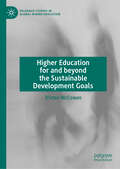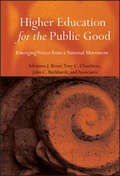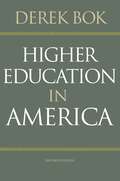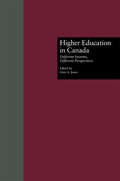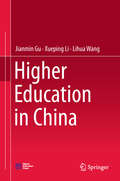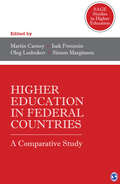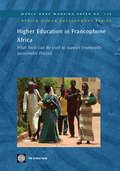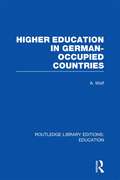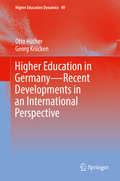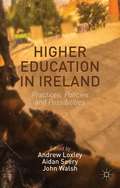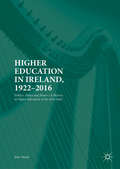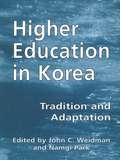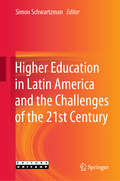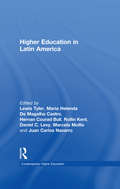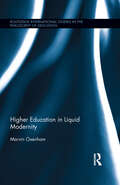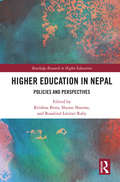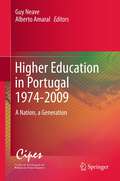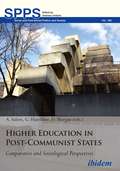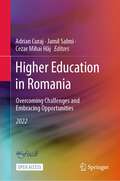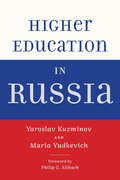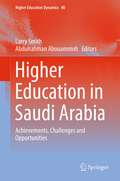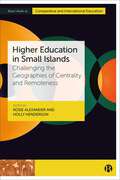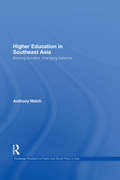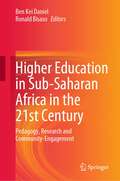- Table View
- List View
Higher Education for and beyond the Sustainable Development Goals (Palgrave Studies in Global Higher Education)
by Tristan McCowanThis book analyses the role of the university in working towards the Sustainable Development Goals. In contrast to the previous Millennium Development Goals, higher education is seen to have a crucial role in this new agenda. Yet how can the university fulfil these weighty expectations, and are the dominant trends in higher education supporting or undermining this vision? This book draws on the idea of the ‘developmental university’, a model characterised by its porous boundaries with society and commitment to teaching, research and community engagement in the public interest. The author examines case studies from Latin America, Africa and other regions to analyse how this model can be revived, countering recent trends of marketisation, status competition and unbundling. The book also considers alternatives to the developmental model drawing on indigenous knowledge systems, looking beyond the SDG framework to the creation of a new form of society. This timely volume will be of interest and value to those working in the field of sustainable development, and to students and scholars of comparative education, international development and higher education studies.
Higher Education for the Public Good
by Kezar Anthony C. Chambers John C. BurkhardtThis important book explores the various ways that higher education contributes to the realization of significant public ends and examines how leaders can promote and enhance their contribution to the social charter through new policies and best practices. It also shows how other sectors of society, government agencies, foundations, and individuals can partner with institutions of higher education to promote the public good. Higher Education for the Public Good includes contributions from leaders in the field--many of whom participated in dialogues hosted by the National Forum on Higher Education for the Public Good. These leaders are responsible for creating successful strategies, programs, and efforts that foster the public's role in higher education.
Higher Education in America: Revised Edition (The William G. Bowen Series #87)
by Derek BokA sweeping assessment of the state of higher education today from former Harvard president Derek BokHigher Education in America is a landmark work--a comprehensive and authoritative analysis of the current condition of our colleges and universities from former Harvard president Derek Bok, one of the nation's most respected education experts. Sweepingly ambitious in scope, this is a deeply informed and balanced assessment of the many strengths as well as the weaknesses of American higher education today. At a time when colleges and universities have never been more important to the lives and opportunities of students or to the progress and prosperity of the nation, Bok provides a thorough examination of the entire system, public and private, from community colleges and small liberal arts colleges to great universities with their research programs and their medical, law, and business schools. Drawing on the most reliable studies and data, he determines which criticisms of higher education are unfounded or exaggerated, which are issues of genuine concern, and what can be done to improve matters.Some of the subjects considered are long-standing, such as debates over the undergraduate curriculum and concerns over rising college costs. Others are more recent, such as the rise of for-profit institutions and massive open online courses (MOOCs). Additional topics include the quality of undergraduate education, the stagnating levels of college graduation, the problems of university governance, the strengths and weaknesses of graduate and professional education, the environment for research, and the benefits and drawbacks of the pervasive competition among American colleges and universities.Offering a rare survey and evaluation of American higher education as a whole, this book provides a solid basis for a fresh public discussion about what the system is doing right, what it needs to do better, and how the next quarter century could be made a period of progress rather than decline.
Higher Education in Canada: Different Systems, Different Perspectives (RoutledgeFalmer Studies in Higher Education #11)
by Glen A. JonesPublished in 1997. People wishing to learn the major phases in the development of Canada's twelve postsecondary higher education systems over the 1945-95 period will find this an essential starting point.
Higher Education in China
by Lihua Wang Jianmin Gu Xueping LiThis book offers international readers a comprehensive introduction to higher education in China, and will help readers around the globe make sense of the huge and complex machinery that makes up the university and college sector in China today. It accompanies readers step by step, allowing them to understand the most important aspects of this sector in China – its history and development, its scope and structure, its operational system and management, and its enrollment and employment processes. It also provides an overview of the various levels of higher education in China, namely: specialized higher education, undergraduate education, postgraduate education, research and faculty. In short, the book will tell you what higher education in China is and how it works. While economic globalization and internationalization of higher education have greatly reduced the differences among educational systems in various countries, it cannot be denied that any given country’s higher education system needs to be deeply rooted in its culture and traditions. In this book, we highlight several distinctive characteristics of higher education in China, including: the ancient roots and modern history, massive scale, diversity, and centralized management and pragmatic trends.
Higher Education in Federal Countries: A Comparative Study (SAGE Studies in Higher Education)
by Martin Carnoy Isak Froumin Simon Marginson Oleg LeshukovHigher Education in Federal Countries: A Comparative Study is a unique study of higher education in nine federal countries—the United States, Canada, Australia, Germany, Mexico, Brazil, Russia, China and India. In this book, leading international scholars discuss the role of federalism and how it shapes higher education in major nation-state actors on the world stage. The editors develop an overarching comparative analysis of the dynamics of central and regional power in higher education, and the national case studies explain how each federal and federal-like higher education system has evolved and how it functions in what are highly varied contexts. The book makes a major contribution to higher education studies and defines a new field of comparative analysis. It also provides important insights into comparative governance and the study of federalism and federal arrangements, with their particular historical, political, legal and economic dimensions.
Higher Education in Francophone Africa
by Pierre Antoine Gioan Pierre AntoineFor more than a decade, higher education and research in the French-speaking countries of Africa has been in a state of severe crisis, stemming from an increasing disparity between available resources and the requirements vital to providing high-quality education. 'Higher Education in Francophone Africa' seeks to: 1) highlight the factors which have led to the development of this situation in most countries; 2) identify the conditions for creating a framework for regulating financially-sustainable higher education and research systems; and 3) identify ways of increasing funding for this sector as well as maintaining its quality.
Higher Education in German Occupied Countries (Routledge Library Editions: Education)
by A WolfThis book gives a comprehensive account of what happened to higher education in Austria, Belgium, the former Czechoslovakia, Denmark, France, Greece, Holland, Italy, Luxembourg, Norway, Poland, Russia and the former Yugoslavia during 1938-1944. It reveals the mentality of the German cultural experts and it describes the reactions of the peoples in the occupied countries.
Higher Education in Germany—Recent Developments in an International Perspective
by Otto Hüther Georg Krücken Michael AlgerOtto Hüther and Georg Krücken analyze the developments of the last 20 years in their new book on German higher education. The foreign observer of German higher education, even the informed foreign observer, struggles to find denominators, not to mention common denominators of a bewildering array of approaches. Otto Hüther and Georg Krücken, in this book, do an absolutely splendid job of offering theoretical perspectives, qualitative and quantitative data, and comparative assessmentsThis book discusses the main higher education structures in Germany, both conceptually and with a particular emphasis on recent developments like, e.g., the growth and differentiation of the system, governance reforms, and the Excellence Initiative. It analyses recent developments from an international perspective, as the German system is clearly embedded in broader, transnational trends. As such, the book provides a comprehensive and detailed account of both new dynamics and stable paths in the German higher education system. This book will be of interest to scholars and students dealing with higher education or Germany as an object of study (e.g. in education research, science studies, organization studies, sociology, psychology, political science), and to higher education managers, leaders, and policymakers who are interested in recent trends in German higher education
Higher Education in Ireland
by John Walsh Andrew Loxley Aidan SeeryThis collection provides the first in-depth, interdisciplinary and over-arching review of higher education in Ireland, situating higher education within the socio-cultural, political and historical context of the country over the past 40 years and the development of European and national policies.
Higher Education in Ireland, 1922–2016: Politics, Policy and Power—A History of Higher Education in the Irish State
by John WalshThis book explores the emergence of the modern higher education sector in the independent Irish state. The author traces its origins from the traditional universities, technical schools and teacher training colleges at the start of the twentieth century, cataloguing its development into the complex, multi-layered and diverse system of the early twenty-first century. Focusing on the socio-political and cultural contexts which shaped the evolution of higher education, the author analyses the interplay between the state, academic institutions and other key institutional actors – notably churches, cultural organizations, employers, trade unions and supranational bodies. This study explores policy, structural and institutional change in Irish higher education, suggesting that the emergence of the modern higher education system in Ireland was influenced by ideologies and trends which owed much to a wider European and international context. The book considers how the exercise of power at local, national and international level impinged on the mission, purpose and values of higher education and on the creation and expansion of a distinctive higher education system. The author also explores a transformation in public and political understandings of the role of higher education, charting the gradual evolution from traditionalist conceptions of the academy as a repository for cultural and religious value formation, to the re-positioning of higher education as a vital factor in the knowledge based economy. This comprehensive volume will appeal to students and scholars of the Irish education system, educators and practitioners in the field, and those interested in higher education in Ireland more generally.
Higher Education in Korea: Tradition and Adaptation (RoutledgeFalmer Studies in Higher Education #Vol. 17)
by Namgi Park John WeidmanThis definitive collection takes an in-depth look at the higher education system in Korea. The editors and contributors present a fundamentally Korean view of the important issues for the Korean higher education system. In systematic, well written essays, they construct theoretical perspectives to analyze the development of the higher education system in Korea's competitive society, a project never before undertaken in the English language.
Higher Education in Latin America and the Challenges of the 21st Century
by Simon SchwartzmanThis book presents an overview of the region with one of the fastest growing higher education sectors in the world. Until the beginning of the 1980s, universities were restricted to the elites in Latin American countries, with less than 5 million students enrolled in its courses. In the last four decades, however, the region went through a boom of higher education institutions and now has more than 25 million students enrolled in more than 3,800 universities – approximately 10% of all students enrolled in higher education courses in the world with four times more higher education institutions than Europe. The boom of Latin American higher education is analyzed in this contributed volume by leading experts from the region. They discuss the causes and consequences of this massive expansion and the challenges they pose for different stakeholders such as governments, private entrepreneurs, teachers, researchers, students, policy makers, educational managers and many other social groups. Topics discussed in the volume include: Massive expansion of tertiary enrollment in Latin America Expansion of private higher education Proliferation of new kinds of institutions, different from the classic university modelThe challenge of developing quality assurance and accreditation systems Internationalization of academic research and teaching in Latin AmericaThe challenge of integrating academic research and technological innovation Higher Education in Latin America and the Challenges of the 21st Century will be a valuable resource for educational researchers, sociologists, political scientists and other social scientists dedicated to the study of the expansion of higher education and its social implications in different parts of the world. The book will also be of interest to policy makers s and both public and private agents interested in understanding the global dynamics of higher education.
Higher Education in Latin American: Private Challenges To Public Dominance (Contemporary Higher Education)
by Daniel C. Levy Lewis A. Tyler Rollin Kent Marcela Mollis Juan Carlos NavarroThe purpose of this series is to bring together the main currents in today's higher education and examine such crucial issues as the changing nature of education in the U.S., the considerable adjustment demanded of institutions, administrators, the faculty; the role of Catholic education; the remarkable growth of higher education in Latin America, contemporary educational concerns in Europe, and more. Among the many specific questions examined in individual articles are: Is it true that women are subtly changing the academic profession? How is power concentrated in academic organizations? How successful are Latin America's private universities? What is the correlation between higher education and employment in Spain? Is minority graduate education in the U.S. producing the desired results?
Higher Education in Liquid Modernity (Routledge International Studies in the Philosophy of Education #30)
by Marvin OxenhamBased in sociologist Zygmunt Bauman’s theory of liquid modernity, this volume describes and critiques key aspects and practices of liquid education--education as market-driven consumption, short life span of useful knowledge, overabundance of information--through a systematic comparison with ancient Greek paideia and medieval university education, producing a sweeping analysis of the history and philosophy ofeducation for the purpose of understanding current higher education, positing a more holisitic alternative model in which students are embedded in a learning commutity that is itself embedded in a larger society. If liquid modernity has left a vacuum where, according to Bauman, the pilot’s cabin is empty, this volume argues that no structure is better positioned to fill this vacuum than the university and outlines a renewed vision of social transformation through higher education.
Higher Education in Market-Oriented Socialist Vietnam: New Players, Discourses, and Practices (International and Development Education)
by Phan Le Ha Doan Ba NgocThis book inspects higher education reform in market-oriented socialist Vietnam, with a focus on newness narratives and enquiry. Engaging in dialogic conversations with global and regional forces and exploring convergences in the domains of policy, curriculum, research, pedagogy, and society, chapter authors analyse ideologies that have entered Vietnam’s educational landscape. Chapters include discussions of post-Soviet legacies, socialist thought, privatization, neoliberalism, global rankings, academic freedom, autonomy, and elitism, as well as the actors, discourses and practices through which they manifest. In so doing, authors’ commentaries juxtapose phenomena in Vietnam with other national contexts such as the Philippines, Brunei Darussalam, Japan, Australia, and Trinidad and Tobago.
Higher Education in Nepal: Policies and Perspectives (Routledge Research in Higher Education)
by Rosalind Latiner Raby Shyam Sharma Krishna BistaThis book presents a showcase of discussions and critical perspectives about Nepalese higher education. Its chapters cover topics such as the impacts of local sociopolitical changes and global forces on public and private education, emerging online and distance education, administrative and intellectual leadership, quality assessment, graduate employability, global mobility of students, and the contributions of global diaspora of Nepalese scholars. The central questions of the book are: What are some of the local and global academic interactions in Nepalese higher education and what are the current challenges and pathways for advancements and improvements? How can Nepalese higher education absorb twenty-first century values of quality education as external forces, while adapting new developments to local needs? How can scholars interested in Nepalese, South Asian, and international higher education create opportunities for scholarship and professional collaboration around research on higher education in this region of South Asia? What issues and perspectives can research and scholarship about Nepal’s higher education offer to international discourse in higher education? The book offers information and resources to international educators interested in the dynamics of Nepalese and, by implication, South Asian higher education by introducing key challenges in policy and programs, innovative changes in curricula, effective approaches in technology application, and strategies for future integration of global reforms in education.
Higher Education in Portugal 1974-2009
by Guy Neave Alberto AmaralA comprehensive, wide ranging and detailed account of the unfolding of higher education and higher education policy in Portugal from 1974 to 2009 by leading policy-makers and scholars, with the explicit purpose of showing how different disciplinary canons and perspectives contribute to the study of higher education and higher education policy including Law and Science Policy perspectives. Whilst focusing on one referential system, this book deals with current policy issues emerging in the wake of the post Bologna period. It also examines their long term historical origins in addition to the measures taken to address them. The substantive chapters are preceded by a detailed Introductory overview that places the issues treated in this volume in a solidly European perspective and sets out explicitly the differences in the dominant political, cultural and social values that set Portuguese as other Continental European systems of higher education apart from their Anglo Saxon counterparts.
Higher Education in Post-Communist States: Comparative and Sociological Perspectives (Soviet And Post-soviet Politics And Society Ser. #190)
by D. Morgan A. Salem G. HazeldineTo what extent have universities in post-Communist states adopted the practices and habits of their branded and consumer-oriented equivalents in the English-speaking world? While not assuming that university education in those states reflects in any mechanistic way the regulated, business-led system long established in places such as the U.S. and now being dramatically realized in countries like Britain, this edited collection identifies some marked shifts in the direction of what might best be described as “neoliberalization,” examining its particularities in local situations where establishment ideologies were, until the early 1990s, deeply alien to all kinds of commercially driven entities. Many of the authors are concerned not only with the linked issues of commercialism, instrumentalism, bureaucracy, and managerialism, framed locally and nationally, but also with the meaning and purpose of universities outside or against their status as efficient gatherers of income. The collection makes specific reference to Lithuania, Hungary, Azerbaijan, Ukraine, Georgia and Russia, and takes in both theoretical and empirical studies of diverse but connected subjects, including the marketization of the academy, regional reactions to globalization as expressed in the representational rhetoric of specific curricula, the role and place of civic education, comparisons between educational settings, pedagogies for a critical and ethical consciousness, corporate and state demands and their effects on academic freedom, and the positive potential of new communication technologies. In all these cases, the system of neoliberalism, or rather an uneven process of neoliberalization, forms a backdrop to the particular issues discussed.
Higher Education in Romania: Overcoming Challenges and Embracing Opportunities
by Adrian Curaj Jamil Salmi Cezar Mihai HâjThis open access book includes a series of relevant policy research articles, elaborared in the framework of the “Quality in higher education: internationalisation and databases to enhance the Romanian education system” project, implemented by the Executive Agency for Higher Education, Research, Development and Innovation Funding (UEFISCDI), together with the Ministry of Education. The project aims to develop and implement systemic measures at tertiary education level, leading to an increased quality of the overall higher education system and universities better prepared for labour market requirements and international standards. The book focuses on areas of interest for Romanian higher education, such as systemic measures to improve access, participation and completion for (vulnerable) students, better promotion of the Romanian higher education to attract students, as well as instruments for a more efficient use of data at higher education level. Each article includes evidence-based policy proposals that could support new strategic initiatives in higher education, including new legislation. Additionally, the collection of articles tells a comprehensive story about the audacity of a higher education system which went through significant challenges to align itself with both European and international trends, as well as respond to national imperatives.Over the last three decades, since the fall of the Iron Curtain, Romanian higher education has undergone significant transformations, aiming to align itself to the latest developments and trends at European and international level. The National Law on Education no. 1/2011 has set the stage for a full implementation of the Bologna Process action lines, taking into account that Romania was already a part of the largest European intergovernmental process – currently the European Higher Education Area (EHEA) – as a founding member.However, since the adoption of this normative framework, the law suffered numerous amendments, making it challenging to observe and achieve coherence in its implementation. Furthermore, Romania is also currently redesigning the strategy for the alocation of European structural funds 2021-2027, based on two strategic documents - the new Education and Employment Operational Programme and the National Recovery and Resilience Plan which highlight the reform and investment priorities at a national level.At the same time, 2021 is a good time to analyze the level of implementation for the objectives and measures included in the National Strategy for Tertiary Education 2015-2020, the Europe 2020 Strategy, and the Bologna Process action lines in the 2010 – 2020 timeframe. Therefore, the present moment may be an important time to assess the impact of strategic documents and actions in the last decade and, possibly, to draft a new National Education Law, better adapted to current realities, starting from the recent initiative by the President of Romania – the Educated Romania strategic vision which was also politically assumed by the Romanian Government.
Higher Education in Russia
by Yaroslav Kuzminov Maria YudkevichA comprehensive, up-to-date look at modern Russian higher education.By the mid-eighteenth century, when the first university appeared in Russia, many European nations could boast of long and glorious university traditions. But Russia, with its poorly developed system of elementary and secondary education, lagged behind other European countries and seemed destined for a long spell of second-tier performance. Yet by the mid-twentieth century, the fully reformed system of Soviet higher education was perceived as an unexpected success, one that transformed the country into a major scientific power throughout the Cold War. Today, the international community is keeping close tabs on the fast development of world-class higher education in Russia, specifically its large-scale changes and reforms.Higher Education in Russia is the first comprehensive, up-to-date overview and analysis of modern Russian higher education. Aimed at a large international audience, it describes the current realities of higher education in Russia, as well as the main principles, logic, and relevant historical and cultural factors. Outlining the evolution of the higher education system in tsarist Russia throughout the nineteenth century, Yaroslav Kuzminov and Maria Yudkevich describe the development of its mass-scale higher education system from the end of the Second World War to the collapse of the Soviet Union and beyond. They also discuss the principal elements of today's Russian higher education system while exploring the system's governance model and the logic of its resource allocation. They touch on university selection, the structure of the country's academic profession, the organization of research, and the major excellence programs of leading universities.Illustrating the idea that the development of the higher education system is very much linked with the European experience, the authors argue that Russian higher education was often the domain of successful (and not so successful) education experiments and innovations. Higher Education in Russia is a must-read for scholars of higher education and Russian history alike.
Higher Education in Saudi Arabia
by Larry Smith Abdulrahman AbouammohThis book provides the first academically rigorous description and critical analysis of the Higher Education system in the Kingdom of Saudi Arabia, and of the vision, strategies and policy imperatives for the future development of Saudi universities. The government of Saudi Arabia has recognized in both policy and practice the necessity of developing its university system to world-class standard. Significantly increasing access and participation in Higher Education across a range of traditional and non-traditional disciplines is directly relevant to the future social and economic growth of the country. This book addresses the way in which Saudi Arabia is moving to develop a quality university system that balances the need for students to gain the knowledge, skills and 'ways of doing' necessary to operate effectively on the world stage while simultaneously maintaining and demonstrating the fundamental values of the Islamic religion and culture. The book provides a description and critical analysis of the key components of the Saudi Higher Education system, and of system-level responses to the challenges and opportunities facing Saudi universities. It is written by a team of Saudi academics and authors of international standing from non-Saudi universities so as to provide both internal and external perspectives on all issues and to place information and ideas in the context of the international Higher Education scene.
Higher Education in Small Islands: Challenging the Geographies of Centrality and Remoteness (Bristol Studies in Comparative and International Education)
by Rosie Alexander and Holly HendersonPinpointing the intersecting concerns of higher education studies and island studies, this book interrogates the role of higher education development in addressing common small island concerns. It demonstrates how small island contexts disrupt normative discourses, understandings and practices in education policy, curricula and experiences.
Higher Education in Southeast Asia: Blurring Borders, Changing Balance (Routledge Research On Public and Social Policy in Asia)
by Anthony WelchThis is the first book to systematically chart and comparatively assess the trend towards private higher education in South East Asia. Caught between conflicting imperatives of spiralling demand, and limited resources, the balance between public and private higher education systems in South East, South, and East Asia has shifted markedly. The author’s detailed case studies of Indonesia, Malaysia, Thailand, the Philippines, and Viet Nam discuss and analyse significant policy issues and touch on key debates surrounding globalisation, including economic globalisation and structural adjustment, and the pressures of cultural globalisation, particularly the role of the English language. Debates surrounding the role of higher education in the ‘knowledge economy’, GATS and cross border trade in educational services are also treated, including the rise of offshore campuses in countries such as Malaysia and Viet Nam. What is argued is that we are witnessing not merely a changing balance between public and private sectors, but a blurring of borders between them, with public HEIs now often behaving more like private, for-profit institutions. The book charts and illustrates these trends, posing questions about their meaning, including issues of transparency, equity, and what the reforms might mean for traditional conceptions of public good in higher education.
Higher Education in Sub-Saharan Africa in the 21st Century: Pedagogy, Research and Community-Engagement
by Ben Kei Daniel Ronald BisasoThis book contributes to the understanding of regional and global perspectives on the development and challenges the higher education sector in sub-Saharan Africa faces in the era of globalization. It focuses on the critical aspects of the higher education sector in the Global South, with a particular emphasis on sub-Saharan Africa. It brings together empirical, theoretical and philosophical perspectives from researchers in some of the leading universities in sub-Saharan Africa. The book highlights the higher education sector’s stages of growth and development and the contemporary challenges it faces in aligning its goals and capacity globally, and maintaining its image and public identity locally. This book covers neoliberal educational reforms, leadership and governance, pedagogy, technology, the global knowledge economy, and digital advancement. It delves into how the nature and practice of learning, teaching, research, and community engagement as core functions of higher education are re-oriented to contribute to societal transformation in Africa. Further, the book discusses the implications of contemporary issues in higher education: internationalization, employability, leadership and management, and accountability and autonomy in teaching, research, and community engagement.
